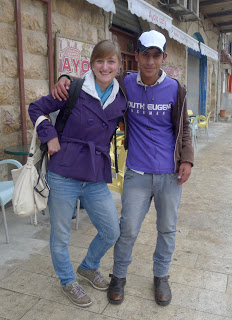
The Purple T-Shirt
Jacqueline Novogratz is one of my biggest inspirations and her book “The Blue Sweater” remains one of my favorites. Novogratz is the co-founder of Acumen Fund–a nonprofit that invests in entrepreneurs and fledgling companies worldwide.
As a young girl, Novogratz had dreams of “saving the world from poverty” and ended up with a fulfilling life that no doubt improved the conditions of thousands worldwide. After college, she landed a high-paying job with Chase Manhattan Bank, but realized that what she was doing had little impact on the lives of the world’s poorest people.
As a result, she left her high-profile job and entered the non-profit world, working for various organizations and eventually spearheading the founding of Rwanda’s first micro-finance organization.
The book delves into Novogratz’ journey from her first interview with Chase Manhattan Bank, to the launching of a nonprofit that brought microfinance to the forefront of international development. It is an inspiring and impressive journey to say the least–a journey in many ways inspired by a blue sweater from Novogratz’ childhood.
When Novogratz was a young girl, her uncle gave her a blue sweater as a gift. It was her favorite article of clothing and one of her most prized possessions. After a few years, Novogratz donated the sweater to Goodwill, not knowing that one day, years later, she would reconnect with it thousands of miles away from home.
In the following years, while Novogratz began her journey into adulthood, her sweater began a voyage of its own–from her hometown to the port of Nairobi, Kenya and then inland to one of the many second-hand clothing stores in the markets of Kigali, Rwanda.
While she was working with an organization in Kigali, Novogratz set out on a run one morning and spotted a boy wearing the very same sweater. After a double take, she went up to the boy and asked to examine the shirt tag. Sure enough, her name was scrawled on the tag.
The discovery of her beloved blue sweater in Rwanda had a great impact on the ways in which Novogratz began to understand the interconnectivity of the world and the butterfly effect that one person can have on the life on another person thousands of miles away.
I imagine that by this point in my post you may be asking yourself why I have included this bit of information in my blog about studying in Jordan, but promise you that it is not totally irrelevant.
I found myself thinking a lot about Novogratz’s story this weekend on my trip to Madaba when I saw a boy wearing a purple and white t-shirt with the words “South Eugene Axemen.”. While I do not claim to have witnessed something of the same proportions as Novogratz, I was nevertheless presented with quite a surreal situation. Why would a young Jordanian boy be wearing a t-shirt of my very high school?
I went up to the boy and asked where his shirt was from. He shrugged and looked confused. My conclusion is the same as that of Novogratz. The shirt was likely donated to a Goodwill in Eugene and redistributed to the town of Madaba, Jordan.
Though it was not my sweater and I do not know whose it was, the fact that I encountered a t-shirt from my high school over 9,000 miles away, propelled me to think about the same questions that raced through Novogratz’s mind when she saw her own sweater in Rwanda. It is a perfect example of how our lives are no longer isolated. The web of connections between people in this world is increasing daily, and seeing an SEHS t-shirt in Jordan illustrates the effects of globalization better than any lecture I have ever had to sit through in college.

